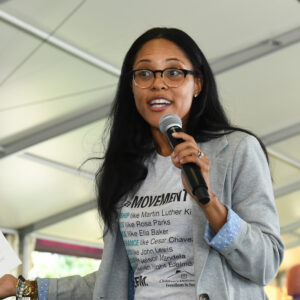Shimica Gaskins
Shimica Gaskins

Executive Director,
Children’s Defense Fund–California
“We’re constantly being told that our ideas are not innovative enough when, in fact, we are trying to reverse the impacts of racism and solve problems that have been persistent for generations, which is the very core of innovation.” – Shimica Gaskins
What is the significance of the California Black Freedom Fund in this moment and in shaping a racially just California?
We’re in a moment in this country, and in California, where structural racism, economic injustice, and America’s legacy of oppression and inhumanity towards Black people has brought forth the groundswell call for change. Thanks to the Black Lives Matter movement, there’s been global recognition of the big and small ways that Black people are dehumanized and disenfranchised. The California Black Freedom Fund establishes that Black-led movements and Black-led organizations matter to our communities and should be invested in to advance the freedom and self determination of Black people most impacted by structural racism. And, that by doing so, we’re advancing everyone’s collective freedom.
Why is it critical for philanthropy to fund grassroots advocates and community leaders, especially Black leaders? What have been some of the key gaps?
A few key gaps that I have experienced and witnessed as a Black woman and as a leader is that, whether it’s in corporate America or in the nonprofit sector, we’re often still not given access to the opportunities as easily as our white peers. Our ideas can be dismissed because our fight for justice doesn’t easily fit into a one- or two-year grant cycle. The willingness to invest in truly radical and transformative ideas may happen, but not at the same investment level as for our peers. We’re constantly being told that our ideas are not innovative enough when, in fact, we are trying to reverse the impacts of racism and solve problems that have been persistent for generations, which is the very core of innovation.
We need to intentionally ensure that Black-led organizations and advocates are supported — that those who often are underfunded, don’t have the resources to actually get the work done and operate, yet are creating a pathway for those closest to the injustice — to lead the work and continue to find the fight for solutions. We know that our communities have the solutions. In fact, our communities have been creating a safety net when government programs –such as education, after-school programs –are not fully funded. It is critical that those organizations get the funding that they need because they’re actually having impact and making change that, if funded, would have a broader impact collectively across our state and, most importantly, in individual lives and in our communities.
Tell us what Black power-building means to you. Why is it so important in California?
In California, Black people make up 6.5% of the population, and yet remain disproportionately affected by poverty and incarceration. One in five children, who are mostly Black and Brown, live in poverty. Black and Brown people make up 28% of the state’s prison population. We arrest and incarcerate more Black children and youth, spending $200,000 to $300,000 a year to do so. We disproportionately and harshly discipline and push Black students out of traditional schools, and into alternative settings, making it increasingly harder for them to get into college. And, in the fifth largest economy in the world, we have one of the largest racial wealth gaps that still remains a chasm to success for Black people. For example, in Los Angeles alone, Black people have 1% of the wealth of white households. For Black Americans in California, that golden opportunity is still not attainable for us.
Black power-building starts first with investing in rebuilding our communities. We have to continue to build out the existing web of Black leadership so that every community across the state is connected. Whether you’re working in South L.A. doing youth development, providing food and social services in the Central Valley, or working in the Bay Area on campaigns to close youth prisons, we are all deeply invested in racial justice, and the pursuit of freedom. In the words of Bettina Love, “Black people in California need to not only survive, but thrive.”
What is your call to action for philanthropy?
When you invest in Black leaders, listen deeply. Don’t just extract the intellectual capital to advance other ideas, but really understand what’s needed in the community through what you’re funding. Donors and foundations have the unprecedented opportunity to create and accelerate a new statewide ecosystem of Black-led organizations that are confronting systemic racism and anti-Blackness. By increasing our capacity, we will be able to drive our state as a whole towards healing and transformative change. Now is the time because our state is projecting deep cuts that will hurt millions of people. We need everyone to be on board to building a better future, especially for Black, Brown, Indigenous and people of color in California.
What is your message to Black organizers and movement leaders, specifically in California?
There’s a saying: “As California goes, so does the rest of the country.” We are currently winning and pushing the rest of the country to do more. During this pandemic alone, we have fought for economic relief for our undocumented brothers and sisters, reforms in our adult and juvenile justice systems, led groundbreaking pursuits for educational justice by removing police from schools in L.A. and Oakland, and pushed for comprehensive investments to lift children and families out of poverty. We have more work to do, but our love for our people — for all people — continues to serve as the solidarity we need to get us to our North Star.
